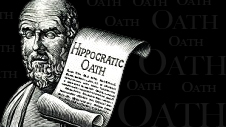
Health professionals assume a duty to do no harm. Debate on this ethical obligation and its consequences has emerged in response to reports of the roles that health professionals have played in the interrogation of detainees taken into U.S. custody since 9/11.
This initiative, a collaboration between the International Human Rights Law Clinic, University of California, Berkeley, School of Law and the Center for Justice and Accountability, offers a variety of resources to help the public explore this issue and join a national debate about health ethics and torture.
We are grateful to the individual donors to the International Human Rights Law Clinic who made this work possible. Travel support was provided by the Rosalinde and Arthur Gilbert Foundation.
Eric Stover, faculty director of the Human Rights Center and adjunct professor of law and public health at Berkeley Law; and Harvey M. Weinstein, senior research fellow, Human Rights Center and clinical professor, School of Public Health provided expert consultation on this project.
The Initiative
Health care professionals’ ethical obligation to do no harm is generating more attention amid reports on the role psychologists have played in designing and implementing interrogation practices of detainees taken into U.S. custody since 9/11. In response, in spring 2010, clinic students developed a new initiative in collaboration with the Center for Justice and Accountability—which offers myriad resources to educate the public on this topic and promote a national discussion about how best to address it.
The site provides audio interviews with expert psychologists about “enhanced interrogation techniques,” and outlines their history, impact, and implications. It also offers topical background materials related to accountability for health professionals complicit in torture, including information on:
- The effects of psychological torture;
- The relationship between the APA and the military;
- International health care ethics; and
- Sanctions by medical associations for torture.
Denouement? New APA Policy Bans Psychologist Participation in National Security Interrogations
Shortly after the September 11th attacks, reports of detainee abuse in Guantánamo Bay began to surface. These reports shed light on psychologists’ participation in detainee interrogations that rose to the level of torture in violation of ethical principles, such as the duty to “do no harm.”
Medical, legal, and ethics professionals embarked on over a decade of advocacy around this issue. They published studies detailing the role of psychologists at the detention facility and called for disciplinary actions against psychologists who designed, implemented, or participated in interrogations. In particular, critics condemned the American Psychological Association (“APA”), the country’s largest organization of psychologists, for aligning its ethical principles with the U.S. government to enable the use of “enhanced interrogation techniques.”
Against this backdrop, in August 2015, the APA significantly overhauled its policy on this matter by passing a resolution prohibiting psychologists from participating in national security interrogations. This paper provides insight into the advocacy efforts and events culminating in the APA resolution. In addition, it describes the key terms of the new policy and the response it has generated in the medical-legal community.
Please consult the paper’s bibliography for further information on this topic.